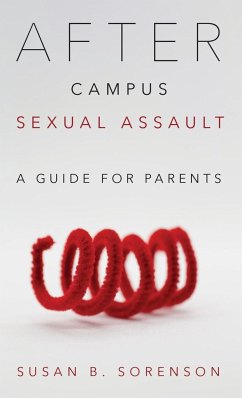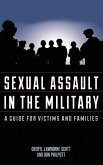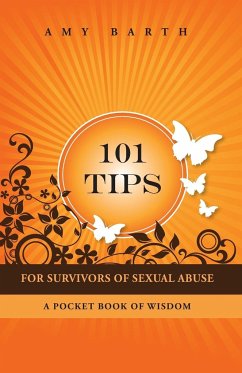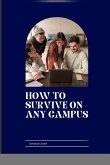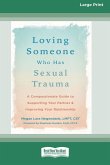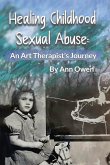- Gebundenes Buch
- Merkliste
- Auf die Merkliste
- Bewerten Bewerten
- Teilen
- Produkt teilen
- Produkterinnerung
- Produkterinnerung
After Campus Sexual Assault: A Guide for Parents is the only comprehensive resource for families dealing with campus sexual assault. Based on the latest research with scores of firsthand accounts from students, mothers, fathers, and campus service providers, this book provides in-depth guidance for navigating the aftermath.
Andere Kunden interessierten sich auch für
![Sexual Assault in the Military Sexual Assault in the Military]() Cheryl Lawhorne-ScottSexual Assault in the Military67,99 €
Cheryl Lawhorne-ScottSexual Assault in the Military67,99 €![The Use of Art in Counselling Child and Adult Survivors of Sexual Abuse The Use of Art in Counselling Child and Adult Survivors of Sexual Abuse]() Maralynn M. HagoodThe Use of Art in Counselling Child and Adult Survivors of Sexual Abuse44,99 €
Maralynn M. HagoodThe Use of Art in Counselling Child and Adult Survivors of Sexual Abuse44,99 €![101 Tips for Survivors of Sexual Abuse 101 Tips for Survivors of Sexual Abuse]() Amy Barth101 Tips for Survivors of Sexual Abuse14,99 €
Amy Barth101 Tips for Survivors of Sexual Abuse14,99 €![Escape From Child Sexual Abuse Escape From Child Sexual Abuse]() S. SharmilaEscape From Child Sexual Abuse12,99 €
S. SharmilaEscape From Child Sexual Abuse12,99 €![How to Survive on Any Campus How to Survive on Any Campus]() Emmanuel JosephHow to Survive on Any Campus44,99 €
Emmanuel JosephHow to Survive on Any Campus44,99 €![Loving Someone Who Has Sexual Trauma Loving Someone Who Has Sexual Trauma]() Megan L NegendankLoving Someone Who Has Sexual Trauma27,99 €
Megan L NegendankLoving Someone Who Has Sexual Trauma27,99 €![Healing Childhood Sexual Abuse Healing Childhood Sexual Abuse]() Ann OwenHealing Childhood Sexual Abuse28,99 €
Ann OwenHealing Childhood Sexual Abuse28,99 €-
-
-
After Campus Sexual Assault: A Guide for Parents is the only comprehensive resource for families dealing with campus sexual assault. Based on the latest research with scores of firsthand accounts from students, mothers, fathers, and campus service providers, this book provides in-depth guidance for navigating the aftermath.
Hinweis: Dieser Artikel kann nur an eine deutsche Lieferadresse ausgeliefert werden.
Hinweis: Dieser Artikel kann nur an eine deutsche Lieferadresse ausgeliefert werden.
Produktdetails
- Produktdetails
- Verlag: Rowman & Littlefield Publishers
- Seitenzahl: 270
- Erscheinungstermin: 10. Juni 2021
- Englisch
- Abmessung: 222mm x 145mm x 18mm
- Gewicht: 475g
- ISBN-13: 9781538117729
- ISBN-10: 153811772X
- Artikelnr.: 60022852
- Herstellerkennzeichnung
- Libri GmbH
- Europaallee 1
- 36244 Bad Hersfeld
- gpsr@libri.de
- Verlag: Rowman & Littlefield Publishers
- Seitenzahl: 270
- Erscheinungstermin: 10. Juni 2021
- Englisch
- Abmessung: 222mm x 145mm x 18mm
- Gewicht: 475g
- ISBN-13: 9781538117729
- ISBN-10: 153811772X
- Artikelnr.: 60022852
- Herstellerkennzeichnung
- Libri GmbH
- Europaallee 1
- 36244 Bad Hersfeld
- gpsr@libri.de
Susan B. Sorenson, PhD, public health researcher and clinical psychologist, is a Professor of Social Policy at the University of Pennsylvania. Her career-teaching, research, policy, and clinical work-has focused on violence and its prevention.
Chapter 1. How Families Work: No Blank Slates, addresses the different ways
that families function and how those functions can be challenged as well as
reinforced when dealing with the crisis of a sexual assault. By the time
they get to college, many students have dealt with other trying
circumstances that shape who they are and how they deal with the world and
an assault.
"Parenting is always hard. Parenting in the current environment, I think,
is a little harder, it's a little riskier. You don't wanna make a bunch of
steel-skinned children. You want them to be open and receptive and willing
to experiment and try new things. Those are important things." Sharon
Chapter 2.College Today: Some Things the Same, Some Not, acknowledges the
excitement, anxiety, and relief of all when a daughter begins college.
Although they, too, might have attended college, parents can't assume that
their rosy recollections of those years will be the experience of their
daughters.
"[School name] was her first choice school. She applied early decision and
got in. It was like God himself reached down and gave his blessing and said
you may go to this wonderful institution." Eric
Chapter 3. So What Happened: Stories Parents Seldom Hear, outlines the
range of experiences that comprise sexual assault. It also describes the
definitions and labels daughters give to their experiences, a process that
likely shapes the conversations, if any, to follow. The chapter title
includes "Stories Parents Seldom Hear" because parents rarely learn much
about the assault itself.
"The next morning I woke up there and I ran out. I had blood and I was just
so freaked out. But I wasn't really sure what had happened. I just thought,
oh, well, that was a shitty way to lose your virginity. I didn't realize
that what had happened was not consensual. It didn't click back then."
Ellie
Chapter 4. Giving and Getting the News: Blame, Shame, and Sometimes
Longing, talks about daughters' decisions to tell or not tell a parent and
the parent's initial reaction, sometimes helpful and sometimes the source
of additional stress. The interactions often involve some combination of
blame, shame, and longing.
"I said he didn't punch you, you were not raped, and therefore it's not
that big of a deal. And as I'm saying these words, I have horrific guilt -
it's very painful. But that's what transpired at the time. She was very
upset that she didn't get the family support that she needed... she was
obviously emotionally traumatized." Tony
Chapter 5.Struggling, Problem Solving: Assault is like a Rock in your Shoe,
It's Always There, asserts that campus sexual assault is more than a single
event. Daughters and parents deal with the event and its aftermath for an
extended period, often negotiating and renegotiating their relationship in
the process. Parents deal with the aftermath regardless of whether they
were told about the assault.
"It gave me a lot of problems with my relationship with my mom after that.
I had problems with her before. I don't know why I decided to call her
about it but I guess I thought that's what people do. But it kind of
destroyed my relationship with her from my own emotional standpoint. And I
also - I was drinking just way too much. I think I felt, especially after I
joined a sorority, I was like, I just wanna be the happy girl that I was.
And maybe if I'm really happy and really cool that it won't matter that
this happened, and no one will know that I have this underlying problem."
Nicole
Chapter 6. Fathers, Often on the Sidelines, recognizes that fathers
typically are a bit different than mothers in terms of helping a daughter
deal with sexual assault. It was common for fathers to stay a bit on the
periphery.
We actually have not spoken about it. I mean, Maria and her mom are like
this [wraps middle finger around index finger] and I'm kind of like the
third person out and that doesn't bother me....But I have made it very
clear to her that in no way did I feel that any of that was her fault. So I
guess I kid with Maria a lot and I don't know if I threw it to her as a
joke or how I tried to open the conversation, but I made it known that,
well, I think I said I wanted to go break his legs. Jeremy
Chapter 7. Study Abroad, addresses the special issues involved when a
daughter is sexually assaulted when participating in a study abroad
program. The novelty of the setting and less familiarity with the culture,
customs, and laws - as well as concern about not wanting to come across as
an "ugly American" - can combine to create special vulnerabilities.
"Most of the conversation had to do with: What do I do? Should I stay?
Should I come home? If I stay, what should I do?...A friend of mine told me
that (my daughter) should reach out to the American Embassy. They were
amazing. She decided to go to the police and press charges and the Embassy
actually escorted her to the police to report what happened. The police, of
course, didn't believe her. There were like, well, where's the evidence? I
mean, they basically almost laughed her out of there - there's no crime
here. But when they found out that she had the incorrect visa, they were
gonna throw her in jail. People sit in jail in [country name] for weeks."
Kathy
Chapter 8. Dealing with Systems, talks about the decision to seek help from
police, health care professionals, and campus authorities. It also
discusses what systems are in place to support students and how to navigate
them.
"Did I leave feeling like I had struck a blow for justice? No." Yolanda
Chapter 9. Campus Sexual Assault: The Big Picture, puts the individual
stories into a larger context. It provides a sense of how campus sexual
assault has been viewed over time (e.g., the first study of campus sexual
assault was published in 1957) and describes the nature and scope as best
we know it. Relying on the published literature over the years, this
chapter is not expected to include quotes.
Chapter 10. Moving Forward, attempts to convey some of the ways that
daughters and families begin to come to terms with what happened and their
hopes for moving on.
"I just wanna see her go down the aisle someday and be married and be
happy. There's not a time I don't go to church or that I don't pray that I
can see them with grandkids because when you're in your 60's, and they're
still in college, it's, I just hope I don't go before they get to where I'd
like to see them be." -- Aaron
that families function and how those functions can be challenged as well as
reinforced when dealing with the crisis of a sexual assault. By the time
they get to college, many students have dealt with other trying
circumstances that shape who they are and how they deal with the world and
an assault.
"Parenting is always hard. Parenting in the current environment, I think,
is a little harder, it's a little riskier. You don't wanna make a bunch of
steel-skinned children. You want them to be open and receptive and willing
to experiment and try new things. Those are important things." Sharon
Chapter 2.College Today: Some Things the Same, Some Not, acknowledges the
excitement, anxiety, and relief of all when a daughter begins college.
Although they, too, might have attended college, parents can't assume that
their rosy recollections of those years will be the experience of their
daughters.
"[School name] was her first choice school. She applied early decision and
got in. It was like God himself reached down and gave his blessing and said
you may go to this wonderful institution." Eric
Chapter 3. So What Happened: Stories Parents Seldom Hear, outlines the
range of experiences that comprise sexual assault. It also describes the
definitions and labels daughters give to their experiences, a process that
likely shapes the conversations, if any, to follow. The chapter title
includes "Stories Parents Seldom Hear" because parents rarely learn much
about the assault itself.
"The next morning I woke up there and I ran out. I had blood and I was just
so freaked out. But I wasn't really sure what had happened. I just thought,
oh, well, that was a shitty way to lose your virginity. I didn't realize
that what had happened was not consensual. It didn't click back then."
Ellie
Chapter 4. Giving and Getting the News: Blame, Shame, and Sometimes
Longing, talks about daughters' decisions to tell or not tell a parent and
the parent's initial reaction, sometimes helpful and sometimes the source
of additional stress. The interactions often involve some combination of
blame, shame, and longing.
"I said he didn't punch you, you were not raped, and therefore it's not
that big of a deal. And as I'm saying these words, I have horrific guilt -
it's very painful. But that's what transpired at the time. She was very
upset that she didn't get the family support that she needed... she was
obviously emotionally traumatized." Tony
Chapter 5.Struggling, Problem Solving: Assault is like a Rock in your Shoe,
It's Always There, asserts that campus sexual assault is more than a single
event. Daughters and parents deal with the event and its aftermath for an
extended period, often negotiating and renegotiating their relationship in
the process. Parents deal with the aftermath regardless of whether they
were told about the assault.
"It gave me a lot of problems with my relationship with my mom after that.
I had problems with her before. I don't know why I decided to call her
about it but I guess I thought that's what people do. But it kind of
destroyed my relationship with her from my own emotional standpoint. And I
also - I was drinking just way too much. I think I felt, especially after I
joined a sorority, I was like, I just wanna be the happy girl that I was.
And maybe if I'm really happy and really cool that it won't matter that
this happened, and no one will know that I have this underlying problem."
Nicole
Chapter 6. Fathers, Often on the Sidelines, recognizes that fathers
typically are a bit different than mothers in terms of helping a daughter
deal with sexual assault. It was common for fathers to stay a bit on the
periphery.
We actually have not spoken about it. I mean, Maria and her mom are like
this [wraps middle finger around index finger] and I'm kind of like the
third person out and that doesn't bother me....But I have made it very
clear to her that in no way did I feel that any of that was her fault. So I
guess I kid with Maria a lot and I don't know if I threw it to her as a
joke or how I tried to open the conversation, but I made it known that,
well, I think I said I wanted to go break his legs. Jeremy
Chapter 7. Study Abroad, addresses the special issues involved when a
daughter is sexually assaulted when participating in a study abroad
program. The novelty of the setting and less familiarity with the culture,
customs, and laws - as well as concern about not wanting to come across as
an "ugly American" - can combine to create special vulnerabilities.
"Most of the conversation had to do with: What do I do? Should I stay?
Should I come home? If I stay, what should I do?...A friend of mine told me
that (my daughter) should reach out to the American Embassy. They were
amazing. She decided to go to the police and press charges and the Embassy
actually escorted her to the police to report what happened. The police, of
course, didn't believe her. There were like, well, where's the evidence? I
mean, they basically almost laughed her out of there - there's no crime
here. But when they found out that she had the incorrect visa, they were
gonna throw her in jail. People sit in jail in [country name] for weeks."
Kathy
Chapter 8. Dealing with Systems, talks about the decision to seek help from
police, health care professionals, and campus authorities. It also
discusses what systems are in place to support students and how to navigate
them.
"Did I leave feeling like I had struck a blow for justice? No." Yolanda
Chapter 9. Campus Sexual Assault: The Big Picture, puts the individual
stories into a larger context. It provides a sense of how campus sexual
assault has been viewed over time (e.g., the first study of campus sexual
assault was published in 1957) and describes the nature and scope as best
we know it. Relying on the published literature over the years, this
chapter is not expected to include quotes.
Chapter 10. Moving Forward, attempts to convey some of the ways that
daughters and families begin to come to terms with what happened and their
hopes for moving on.
"I just wanna see her go down the aisle someday and be married and be
happy. There's not a time I don't go to church or that I don't pray that I
can see them with grandkids because when you're in your 60's, and they're
still in college, it's, I just hope I don't go before they get to where I'd
like to see them be." -- Aaron
Chapter 1. How Families Work: No Blank Slates, addresses the different ways
that families function and how those functions can be challenged as well as
reinforced when dealing with the crisis of a sexual assault. By the time
they get to college, many students have dealt with other trying
circumstances that shape who they are and how they deal with the world and
an assault.
"Parenting is always hard. Parenting in the current environment, I think,
is a little harder, it's a little riskier. You don't wanna make a bunch of
steel-skinned children. You want them to be open and receptive and willing
to experiment and try new things. Those are important things." Sharon
Chapter 2.College Today: Some Things the Same, Some Not, acknowledges the
excitement, anxiety, and relief of all when a daughter begins college.
Although they, too, might have attended college, parents can't assume that
their rosy recollections of those years will be the experience of their
daughters.
"[School name] was her first choice school. She applied early decision and
got in. It was like God himself reached down and gave his blessing and said
you may go to this wonderful institution." Eric
Chapter 3. So What Happened: Stories Parents Seldom Hear, outlines the
range of experiences that comprise sexual assault. It also describes the
definitions and labels daughters give to their experiences, a process that
likely shapes the conversations, if any, to follow. The chapter title
includes "Stories Parents Seldom Hear" because parents rarely learn much
about the assault itself.
"The next morning I woke up there and I ran out. I had blood and I was just
so freaked out. But I wasn't really sure what had happened. I just thought,
oh, well, that was a shitty way to lose your virginity. I didn't realize
that what had happened was not consensual. It didn't click back then."
Ellie
Chapter 4. Giving and Getting the News: Blame, Shame, and Sometimes
Longing, talks about daughters' decisions to tell or not tell a parent and
the parent's initial reaction, sometimes helpful and sometimes the source
of additional stress. The interactions often involve some combination of
blame, shame, and longing.
"I said he didn't punch you, you were not raped, and therefore it's not
that big of a deal. And as I'm saying these words, I have horrific guilt -
it's very painful. But that's what transpired at the time. She was very
upset that she didn't get the family support that she needed... she was
obviously emotionally traumatized." Tony
Chapter 5.Struggling, Problem Solving: Assault is like a Rock in your Shoe,
It's Always There, asserts that campus sexual assault is more than a single
event. Daughters and parents deal with the event and its aftermath for an
extended period, often negotiating and renegotiating their relationship in
the process. Parents deal with the aftermath regardless of whether they
were told about the assault.
"It gave me a lot of problems with my relationship with my mom after that.
I had problems with her before. I don't know why I decided to call her
about it but I guess I thought that's what people do. But it kind of
destroyed my relationship with her from my own emotional standpoint. And I
also - I was drinking just way too much. I think I felt, especially after I
joined a sorority, I was like, I just wanna be the happy girl that I was.
And maybe if I'm really happy and really cool that it won't matter that
this happened, and no one will know that I have this underlying problem."
Nicole
Chapter 6. Fathers, Often on the Sidelines, recognizes that fathers
typically are a bit different than mothers in terms of helping a daughter
deal with sexual assault. It was common for fathers to stay a bit on the
periphery.
We actually have not spoken about it. I mean, Maria and her mom are like
this [wraps middle finger around index finger] and I'm kind of like the
third person out and that doesn't bother me....But I have made it very
clear to her that in no way did I feel that any of that was her fault. So I
guess I kid with Maria a lot and I don't know if I threw it to her as a
joke or how I tried to open the conversation, but I made it known that,
well, I think I said I wanted to go break his legs. Jeremy
Chapter 7. Study Abroad, addresses the special issues involved when a
daughter is sexually assaulted when participating in a study abroad
program. The novelty of the setting and less familiarity with the culture,
customs, and laws - as well as concern about not wanting to come across as
an "ugly American" - can combine to create special vulnerabilities.
"Most of the conversation had to do with: What do I do? Should I stay?
Should I come home? If I stay, what should I do?...A friend of mine told me
that (my daughter) should reach out to the American Embassy. They were
amazing. She decided to go to the police and press charges and the Embassy
actually escorted her to the police to report what happened. The police, of
course, didn't believe her. There were like, well, where's the evidence? I
mean, they basically almost laughed her out of there - there's no crime
here. But when they found out that she had the incorrect visa, they were
gonna throw her in jail. People sit in jail in [country name] for weeks."
Kathy
Chapter 8. Dealing with Systems, talks about the decision to seek help from
police, health care professionals, and campus authorities. It also
discusses what systems are in place to support students and how to navigate
them.
"Did I leave feeling like I had struck a blow for justice? No." Yolanda
Chapter 9. Campus Sexual Assault: The Big Picture, puts the individual
stories into a larger context. It provides a sense of how campus sexual
assault has been viewed over time (e.g., the first study of campus sexual
assault was published in 1957) and describes the nature and scope as best
we know it. Relying on the published literature over the years, this
chapter is not expected to include quotes.
Chapter 10. Moving Forward, attempts to convey some of the ways that
daughters and families begin to come to terms with what happened and their
hopes for moving on.
"I just wanna see her go down the aisle someday and be married and be
happy. There's not a time I don't go to church or that I don't pray that I
can see them with grandkids because when you're in your 60's, and they're
still in college, it's, I just hope I don't go before they get to where I'd
like to see them be." -- Aaron
that families function and how those functions can be challenged as well as
reinforced when dealing with the crisis of a sexual assault. By the time
they get to college, many students have dealt with other trying
circumstances that shape who they are and how they deal with the world and
an assault.
"Parenting is always hard. Parenting in the current environment, I think,
is a little harder, it's a little riskier. You don't wanna make a bunch of
steel-skinned children. You want them to be open and receptive and willing
to experiment and try new things. Those are important things." Sharon
Chapter 2.College Today: Some Things the Same, Some Not, acknowledges the
excitement, anxiety, and relief of all when a daughter begins college.
Although they, too, might have attended college, parents can't assume that
their rosy recollections of those years will be the experience of their
daughters.
"[School name] was her first choice school. She applied early decision and
got in. It was like God himself reached down and gave his blessing and said
you may go to this wonderful institution." Eric
Chapter 3. So What Happened: Stories Parents Seldom Hear, outlines the
range of experiences that comprise sexual assault. It also describes the
definitions and labels daughters give to their experiences, a process that
likely shapes the conversations, if any, to follow. The chapter title
includes "Stories Parents Seldom Hear" because parents rarely learn much
about the assault itself.
"The next morning I woke up there and I ran out. I had blood and I was just
so freaked out. But I wasn't really sure what had happened. I just thought,
oh, well, that was a shitty way to lose your virginity. I didn't realize
that what had happened was not consensual. It didn't click back then."
Ellie
Chapter 4. Giving and Getting the News: Blame, Shame, and Sometimes
Longing, talks about daughters' decisions to tell or not tell a parent and
the parent's initial reaction, sometimes helpful and sometimes the source
of additional stress. The interactions often involve some combination of
blame, shame, and longing.
"I said he didn't punch you, you were not raped, and therefore it's not
that big of a deal. And as I'm saying these words, I have horrific guilt -
it's very painful. But that's what transpired at the time. She was very
upset that she didn't get the family support that she needed... she was
obviously emotionally traumatized." Tony
Chapter 5.Struggling, Problem Solving: Assault is like a Rock in your Shoe,
It's Always There, asserts that campus sexual assault is more than a single
event. Daughters and parents deal with the event and its aftermath for an
extended period, often negotiating and renegotiating their relationship in
the process. Parents deal with the aftermath regardless of whether they
were told about the assault.
"It gave me a lot of problems with my relationship with my mom after that.
I had problems with her before. I don't know why I decided to call her
about it but I guess I thought that's what people do. But it kind of
destroyed my relationship with her from my own emotional standpoint. And I
also - I was drinking just way too much. I think I felt, especially after I
joined a sorority, I was like, I just wanna be the happy girl that I was.
And maybe if I'm really happy and really cool that it won't matter that
this happened, and no one will know that I have this underlying problem."
Nicole
Chapter 6. Fathers, Often on the Sidelines, recognizes that fathers
typically are a bit different than mothers in terms of helping a daughter
deal with sexual assault. It was common for fathers to stay a bit on the
periphery.
We actually have not spoken about it. I mean, Maria and her mom are like
this [wraps middle finger around index finger] and I'm kind of like the
third person out and that doesn't bother me....But I have made it very
clear to her that in no way did I feel that any of that was her fault. So I
guess I kid with Maria a lot and I don't know if I threw it to her as a
joke or how I tried to open the conversation, but I made it known that,
well, I think I said I wanted to go break his legs. Jeremy
Chapter 7. Study Abroad, addresses the special issues involved when a
daughter is sexually assaulted when participating in a study abroad
program. The novelty of the setting and less familiarity with the culture,
customs, and laws - as well as concern about not wanting to come across as
an "ugly American" - can combine to create special vulnerabilities.
"Most of the conversation had to do with: What do I do? Should I stay?
Should I come home? If I stay, what should I do?...A friend of mine told me
that (my daughter) should reach out to the American Embassy. They were
amazing. She decided to go to the police and press charges and the Embassy
actually escorted her to the police to report what happened. The police, of
course, didn't believe her. There were like, well, where's the evidence? I
mean, they basically almost laughed her out of there - there's no crime
here. But when they found out that she had the incorrect visa, they were
gonna throw her in jail. People sit in jail in [country name] for weeks."
Kathy
Chapter 8. Dealing with Systems, talks about the decision to seek help from
police, health care professionals, and campus authorities. It also
discusses what systems are in place to support students and how to navigate
them.
"Did I leave feeling like I had struck a blow for justice? No." Yolanda
Chapter 9. Campus Sexual Assault: The Big Picture, puts the individual
stories into a larger context. It provides a sense of how campus sexual
assault has been viewed over time (e.g., the first study of campus sexual
assault was published in 1957) and describes the nature and scope as best
we know it. Relying on the published literature over the years, this
chapter is not expected to include quotes.
Chapter 10. Moving Forward, attempts to convey some of the ways that
daughters and families begin to come to terms with what happened and their
hopes for moving on.
"I just wanna see her go down the aisle someday and be married and be
happy. There's not a time I don't go to church or that I don't pray that I
can see them with grandkids because when you're in your 60's, and they're
still in college, it's, I just hope I don't go before they get to where I'd
like to see them be." -- Aaron

